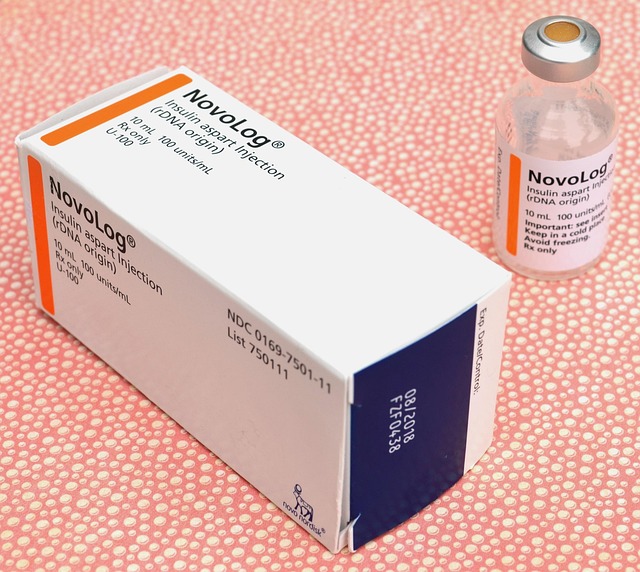Semaglutide, a GLP-1 receptor agonist, revolutionizes diabetes management with its dual benefits: superior blood sugar control and significant weight loss. Clinical trials prove its efficacy in lowering HbA1c, reducing cardiovascular risks, and improving overall patient outcomes. This once-weekly medication enhances insulin sensitivity, offers appetite suppression, and stabilizes blood sugar levels, making it a game-changer for type 2 diabetes and obesity treatment. Long-term benefits include risk mitigation for complications, improved quality of life, and enhanced patient satisfaction. Future research aims to expand its use and optimize delivery methods.
“Discover how semaglutide diabetes treatment is transforming patient outcomes. This article explores the multifaceted benefits of semaglutide, a cutting-edge therapy, in managing blood sugar levels, improving insulin sensitivity, and aiding weight loss. From reducing diabetic complications to enhancing lifestyle adjustments and cardiovascular health, semaglutide emerges as a game-changer. Learn how it boosts quality of life and what future perspectives hold for this effective treatment.”
Semaglutide's Impact on Blood Sugar Control

Semaglutide, a novel glucagon-like peptide-1 (GLP-1) receptor agonist, has significantly revolutionized the landscape of type 2 diabetes management. Its unique mechanism of action not only enhances insulin secretion in a glucose-dependent manner but also reduces glucagon release, leading to improved blood sugar control. In clinical trials, semaglutide diabetes treatment has demonstrated superior efficacy in lowering HbA1c levels compared to placebo and many other anti-diabetic medications.
The impact of semaglutide on blood sugar control is multifaceted. It promotes weight loss, which can enhance insulin sensitivity and further improve glycemic management. Additionally, semaglutide’s prolonged duration of action allows for once-weekly administration, enhancing patient adherence and convenience. This accessibility and effectiveness make semaglutide a game-changer in diabetes treatment, offering patients a more manageable and potentially cure-like approach to controlling their condition.
Improved Insulin Sensitivity: A Key Benefit

Semaglutide diabetes treatment has shown significant promise in improving patient outcomes, particularly by enhancing insulin sensitivity. This key benefit is one of the primary reasons for its growing popularity in managing type 2 diabetes. By increasing insulin sensitivity, semaglutide allows the body to use insulin more effectively, leading to better blood sugar control.
This medication works by mimicking a natural hormone that stimulates insulin production and suppresses glucagon, which helps reduce blood sugar levels. As a result, patients on semaglutide diabetes treatment often experience significant improvements in their glycemic control, weight management, and overall metabolic health. This multifaceted benefit makes semaglutide a game-changer in the world of diabetes care.
Weight Management and Semaglutide Therapy

Semaglutide diabetes treatment has shown significant promise in weight management, a crucial aspect of managing type 2 diabetes. This innovative therapy targets not just blood sugar levels but also contributes to substantial weight loss. The mechanism involves mimicking the natural hormone GLP-1, which stimulates insulin production and suppresses glucagon, leading to improved glucose control. Moreover, semaglutide’s effect on satiety helps individuals feel fuller for longer, curbing excessive eating and supporting sustainable weight reduction.
Clinical studies have demonstrated that patients on semaglutide diabetes treatment experienced an average weight loss of 8-10% over a year, which is substantial in the context of chronic disease management. This not only improves overall health metrics but also enhances patient outcomes, including reduced risk of diabetes complications. Effective weight management through semaglutide therapy offers a promising approach to treating both diabetes and obesity simultaneously, potentially transforming the lives of those struggling with these conditions.
Reducing Complications: Long-Term Effects

Semaglutide diabetes treatment has shown promising results in reducing complications associated with the disease, particularly in the long term. By mimicking the effects of the natural hormone GLP-1, semaglutide helps lower blood sugar levels and improves overall metabolic control. This not only slows down the progression of diabetic retinopathy, nephropathy, and neuropathy but also significantly decreases the risk of cardiovascular events, such as heart failure or stroke.
The long-term benefits of semaglutide extend beyond these primary complications. Studies have shown a reduction in microvascular complications, including nerve damage and kidney disease, which are often silent and insidious. Additionally, patients on semaglutide treatment report improved quality of life due to better blood sugar control, fewer episodes of hypoglycemia, and easier management of their diabetes. These positive outcomes underscore the value of semaglutide as a potent therapeutic option for managing diabetes and improving patient well-being.
Patient Satisfaction with Semaglutide Treatment

Many patients with type 2 diabetes express high satisfaction with semaglutide diabetes treatment, citing several key benefits. The medication’s ability to significantly lower blood sugar levels while helping with weight loss is particularly appreciated. This dual action addresses two primary concerns for diabetics, enhancing overall well-being and quality of life.
The convenience of once-weekly dosing and the minimal side effects experienced by most patients contribute to patient satisfaction with semaglutide. Additionally, as a long-acting glucagon-like peptide-1 (GLP-1) receptor agonist, it promotes feelings of satiety, reducing hunger pangs and making meal planning less stressful. Patient feedback consistently highlights these aspects, positioning semaglutide as an effective and patient-friendly option for diabetes management.
Lifestyle Changes in Diabetic Care Plans

Incorporating lifestyle changes is a key component of any successful semaglutide diabetes treatment plan. This involves adopting healthier habits such as regular exercise, balanced eating, and stress management. Patients are encouraged to engage in physical activities that they enjoy, aiming for at least 150 minutes of moderate-intensity aerobic activity or 75 minutes of vigorous activity per week. Additionally, dietary adjustments focus on whole foods, with a reduced emphasis on refined carbohydrates and an increased intake of fiber. This balanced approach, combined with semaglutide therapy, can lead to significant improvements in glycemic control.
Lifestyle modifications go hand in hand with the medication, as they work synergistically to optimize patient outcomes. By making these changes, individuals with diabetes can not only manage their condition effectively but also reduce the risk of long-term complications. Education and support from healthcare professionals are vital to help patients navigate these lifestyle adjustments and ensure they receive tailored guidance for their specific needs, enhancing the overall effectiveness of semaglutide diabetes treatment.
Semaglutide's Role in Cardiovascular Health

Semaglutide, a groundbreaking medication in the realm of diabetes management, has emerged as a powerful tool for improving patient outcomes, particularly when it comes to cardiovascular health. In addition to its primary role in glycemic control, semaglutide diabetes treatment offers significant benefits beyond blood sugar regulation. Clinical trials have consistently demonstrated that this innovative therapy reduces the risk of major adverse cardiovascular events, such as heart attacks and strokes, in patients with type 2 diabetes.
The positive impact on cardiovascular health is attributed to various mechanisms. Semaglutide promotes weight loss, which, in turn, decreases blood pressure and improves lipid profiles. It also enhances insulin sensitivity and suppresses glucagon secretion, leading to better overall metabolic control. These effects collectively contribute to a lower risk of cardiovascular complications, making semaglutide diabetes treatment a game-changer for patients facing the dual burden of diabetes and heart disease.
Enhancing Quality of Life for Diabetes Patients

The impact of semaglutide diabetes treatment extends beyond blood sugar control, significantly enhancing the quality of life for patients. This innovative therapy offers a comprehensive approach to managing type 2 diabetes by not only reducing HbA1c levels but also addressing comorbid conditions and improving overall well-being. By stabilizing blood sugar levels, semaglutide can lead to a cascade of positive effects, including weight loss, reduced risk of cardiovascular events, and better kidney function.
Patients on semaglutide diabetes treatment often experience improved energy levels, leading to increased physical activity and a higher quality of life. The convenience of once-weekly administration also simplifies adherence to treatment regimens, allowing individuals to focus more on their overall health and less on daily medication routines. This shift in focus can foster a sense of empowerment and control over one’s diabetes management, ultimately enhancing patient satisfaction and engagement in care.
Future Perspectives on Semaglutide's Efficacy

The future of semaglutide diabetes treatment looks promising, with ongoing research continually exploring its potential. Studies are delving deeper into its long-term effects, aiming to understand its role in preventing complications and improving patient quality of life. As technology advances, there’s a growing interest in personalizing treatments, combining semaglutide with other innovative therapies, and developing user-friendly delivery methods. These efforts aim to enhance patient adherence and outcomes, making semaglutide diabetes treatment an exciting area of development.
The versatility of semaglutide is evident in its potential applications beyond type 2 diabetes. Recent findings suggest its beneficial effects on cardiovascular health and weight management, opening doors for new indications. Additionally, the ongoing assessment of semaglutide’s safety profile will be crucial in expanding its use, ensuring patients receive the maximum benefits while minimizing risks.
